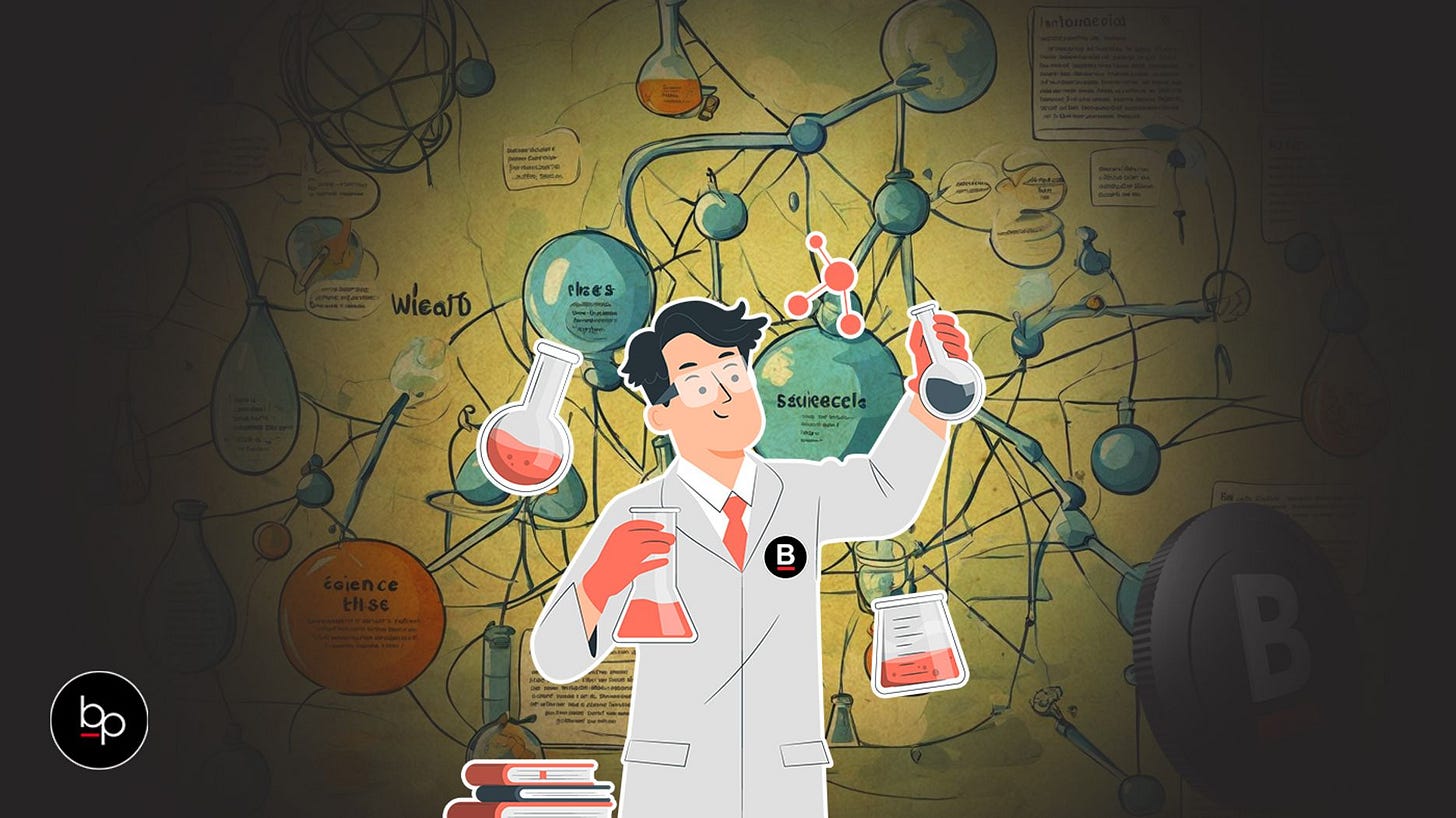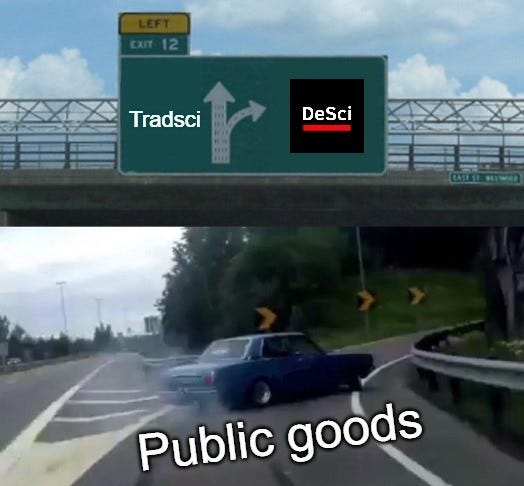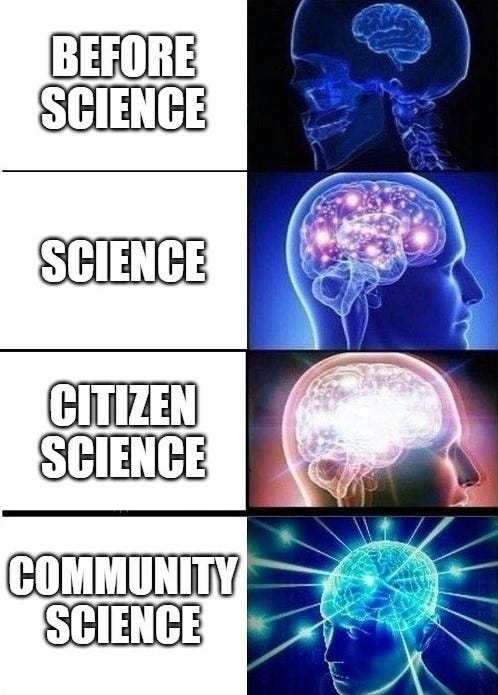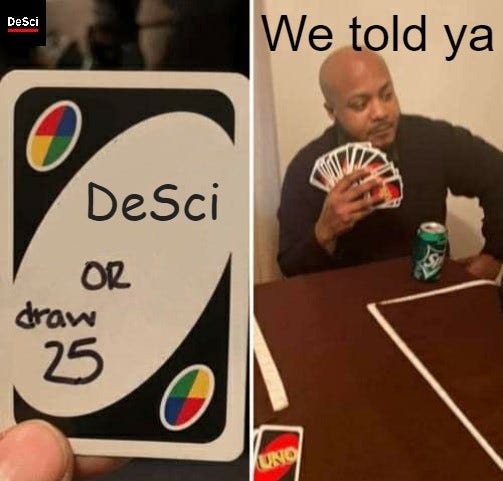DeSci Goes Bankless | State of the DAOs
You're reading State of the DAOs, the high-signal low-noise newsletter for understanding DAOs.
gm gm! We began our discussion of decentralized science in the last State of the DAOs with an article titled A Mental Model to Understand DeSci, which proposed a “mental model where DeSci is not a “next step” in the history of science, but rather an alternative to help science develop new models to do research in a meaningful way..." This week we continue exploring the contours of decentralized science, but with a twist: DeSci is a natural extension of the Bankless movement.
As enshrined in the BanklessDAO Constitution, “Bankless is a movement for pioneers seeking liberation from the tyranny of the traditional financial system. Going Bankless means adopting decentralized, permissionless, and censorship-resistant technology. Through these means, we will achieve financial self-sovereignty, security, and prosperity.”
As with the Bankless movement, decentralizing ownership and transparency of scientific assets, like “intellectual property, licensing rights, and ownership itself”, fosters innovation. Likewise, “self-sovereignty of digital assets will inherently accelerate the proliferation of scientific information.” If this sounds exciting to you (it should!) get involved with BanklessDAO’s new DeSci working group, the details for which can be found below.
As always, we conclude with a TL;DR on some of the most recent DAO ecosystem takes and thought pieces, making it easy for you to cut through the noise and learn everything you need to know about the current state of the DAOs.
Contributors: flowscience, Chameleon, angelspeaks, Quilia, Warrior, Vi-Fi, Boluwatife, Kornekt, trewkat, siddhearta, HiroKennelly
This is an official newsletter of Bankless Publishing, a BanklessDAO-affiliated project. Please subscribe and share to help us grow our audience as we fulfill our mission to build user-friendly crypto onramps.
DeSci Goes Bankless
Author: flowscience

TL;DR
The Bankless thesis extends to decentralized science (DeSci).
Self-sovereignty over digital assets includes the products of scientific research and collaboration.
Sign up for the BanklessDeSci Virtual Unconference!
What Is Science?
There are many different answers to this question. Let’s start by comparing two of them.
“The systematic observation of natural events and conditions in order to discover facts about them and to formulate laws and principles based on these facts. The organized body of knowledge that is derived from such observations and that can be verified or tested by further investigation.”
Academic Press Dictionary of Science & Technology
“Science alone of all the subjects contains within itself the lesson of the danger of belief in the infallibility of the greatest teachers in the preceding generation . . . As a matter of fact, I can also define science another way: Science is the belief in the ignorance of experts.”
Richard Feynman
I much prefer the second definition.
However, the first one highlights key elements of the scientific process that differentiate epistemically valid methods of testing a hypothesis from the extensive list of logical fallacies that create so many common misunderstandings of science in modern society.
“Real” science is based on the assumption that we are always wrong, the “null” hypothesis. Scientific observation relies on measurements external to ourselves. Objectivity and truth are the only goals when interpreting evidence.
At least, as close as we can get to the truth.
What Does It Mean to Decentralize Science?
Paradigm shifts in science are almost infinitely rare compared to the number of observations made on an annual basis. The modern world operates entirely because of advances made in our scientific understanding of the universe. That happens because science-based education has been incorporated into state-mandated education systems around the world; massively proliferating scientific knowledge as common knowledge.
Yet, most “end users'' of science remain entirely uninvolved in the process itself.
Science has traditionally been prohibitively expensive for the majority of the population. For the past several decades, there has been increased interest in so-called “citizen science” that often involves simple experiments which can be done by individuals with minimal training or background knowledge.
Even more recently, the “open-science” movement has followed alongside the open-source software movement. Increasing access to reproducible scientific data is growing in importance in the age of information. Knowledge itself is a universal public good.
Enter web3.
Bitcoin solved the Byzantine Generals Problem and provided the ability to verifiably own digital assets. Ethereum furthered this ability by enabling digital assets to be contracts, so called “smart contracts”, because the binding terms are automatically executed according to transparent and immutable code. Intellectual property, licensing rights, and ownership itself – these are all contracts that have been upheld by the rules of society to increase the incentive for private citizens to develop new technology. The conclusion is obvious: decentralizing ownership and transparency fosters innovation.
Self-sovereignty of digital assets will inherently accelerate the proliferation of scientific information.
The Origin of BanklessDeSci
BanklessDAO (the community of nearly 30k members) and BanklessHQ (the podcast with > 200K subscribers) have recently started showing broader interest in the DeSci movement. If you're not familiar with Bankless (either the podcast or the DAO), the general mission is to help more people express self-sovereignty through ownership of digital assets, helping people “go Bankless.”
The Bankless thesis naturally extends to DeSci because self-sovereignty of digital assets and transparency fosters innovation and the proliferation of information. Out of this inspiration, the BanklessDeSci working group spun up earlier this year from within BanklessDAO.
BanklessDeSci creates a pipeline for:
DeSci education for non-scientists, particularly BanklessDAO members.
Web3 and DeFi education for scientists (non-BanklessDAO members).
DeSci funding opportunities for scientists in BanklessDAO.
Who is BanklessDeSci?
Students and entrepreneurial scientists interested in web3.
Researchers and independent scientists seeking greater access to funding/publishing.
People who want to decentralize healthcare, biotech, and big tech in general.
Investors in web3 and science/tech.
BanklessDeSci is composed of a range of enthusiasts from both BanklessDAO and the broader DeSci community. We coordinate activities through a public chat group and hold weekly meetings open to anyone who wants to get involved. Join our Telegram group and say hello!
What’s Next?
We're planning to deliver on two goals in Q4 2023:
Create a "DeSci 101" lesson for Bankless Academy.
Host a 4-hr "Virtual Unconference" on Zoom either in the last week of November or first week of December.
An introductory “DeSci 101” lesson would be useful to increase awareness about DeSci and serve as an educational reference for members of the BanklessDAO community.
Why are we hosting a virtual #DeSci "Unconference"? Quite simply, it was the most Bankless thing we could think of. 🏴
“An unconference, also known as an EdCamp, is a participant-driven conference model that emerged in the early 2010s. It subverts the expert-centered structure of traditional conferences by prioritizing participant voices as leaders and decision makers. Unlike traditional conferences, attendees decide on the agenda, discussion topics, workshops, and even the time and venues. The informal and flexible program allows participants to suggest topics of their own interest and choose sessions accordingly. The event lives and dies by the participation of its attendees, who decide what topics will be discussed and convene the individual breakout sessions.” - ChatGPT
If you're interested in participating in the first ever BanklessDeSci Virtual Unconference as a session facilitator, attendee/participant, or sponsor, please fill out this form.
Stay tuned for more #DeSci. 🧪🏴
Resources to Get Started
Learn the basics of DeSci from the Ethereum Foundation.
Listen to the DeScientralized Mini-Series on Crypto Sapiens.
Watch the BanklessHQ Interview Series at Zuzalu.
Explore the Awesome DeSci Repository for a community-curated list of resources.
Recent Press: Editorial in Nature Biotech and Brian Armstrong at SciCon 2023.
Ecosystem Takes
🔥 and 🧊 insights from across the DAO ecosystem:
The DAO Playbook (v1)
Author: 0xJustice.eth
🔑 Insights: DAOs have been around for some time and although more people are getting familiar with these organizations, most people don’t understand how to start one or how they work. In this article, the author talks about his view of DAOs, what they are, and how they operate.
DAOs are decentralized platforms with governance structures where individuals own and collectively control digital assets. They run on smart contracts and channel capital towards its preservation and improvement.
DAOs are viewed as tokenized internet communities that pool funds to achieve a common goal or make a physical impact. These communities surpass the traditional internet communities as everyone gets a say in the appropriation of funds.
Not everyone who bought into the vision of a DAO can do the commensurate work. As a result, some technical work is outsourced to builders to fill the operational gap.
Machiavelli for DAOs: Principles for Fixing Decentralized Governance (Part 1)
Author: Miles Jennings
🔑 Insights: Whatever you make of the Renaissance-era Italian philosopher and political operator Niccolo Machiavelli, many of the principles explored in his writings about leadership and the preservation of political liberty remain relevant today. The author believes several Machiavellian principles can be applied to fix decentralized governance in web3.
Decentralized governance enables web3 protocols to decentralize and achieve credible neutrality.
Given the practical challenges associated with direct democracy, many DAOs have turned to representative democracy to enhance their decentralized governance.
The Machiavellian principles begin with a belief that an objective science of politics and society is possible and that the primary theme is the struggle for social power.
While the right to public opposition is alive and well in web3, DAOs are sometimes unable to foster healthy opposition when token holdings aren’t evenly spread across competing perspectives.
Empowering any parties within a decentralized system could undermine the very decentralization of such systems as it could lead to potentially significant information asymmetries, and increase the vulnerability of those systems to governance attacks.
Machiavelli for DAOs: Designing Effective Decentralized Governance (Part 2)
Author: Miles Jennings
🔑 Insights: This companion piece to Part 1 above discusses the application of Machiavellian principles to decentralized governance in web3, aiming to address current shortcomings in emerging protocols and DAOs. The piece also provides design considerations, strategies, and tactics for implementation, using the hypothetical example of a web3 marketplace protocol called "Blockzaar.”
Designing a DAO requires identifying different stakeholder groups, including users, apps, developers, and investors. Understanding stakeholder incentives is crucial because a successful DAO depends on these groups being active and economically incentivized.
Credible neutrality and minimal discrimination in DAOs can be achieved by prioritizing governance minimization, user choice in decision making, and avoiding forking. This results in a competitive ecosystem.
In web3 protocols with minimal governance, effective decision making requires bi-cameral governance, with a stakeholder council and delegate council. This ensures a balance of power and interests.
DAOs can ensure dynamic leadership by embracing the Machiavellian principle of constant upheaval, implementing strategies like term limits and stakeholder removal, and enabling direct elections. This promotes community participation and addresses issues in token-based voting systems.
To make DAOs more accountable, limit the leadership class, build a client ecosystem, regularly remove delegates, and implement lockup mechanisms. These approaches support minimal governance, diverse stakeholders, and stakeholder capitalism.
How SubDAOs Are Making a Bear Market Comeback
Author: DeFi Dave
🔑 Insights: The article provides an in-depth look at how subDAOs can help decentralized protocols scale governance and evolve through market cycles. The key insight is that subDAOs enable valuable experimentation and decentralization if well-designed with accountability.
In bear markets, subDAOs allow innovation in parallel to the main DAO. They can take on specialized objectives and try new tokenomics and structures.
Bootstrapping subDAOs with tokens and funding gives autonomy, but accountability via milestones and stakeholder relationships remains critical.
Politicking to secure subDAO funding requires tact, but the process shouldn't distract from subDAO objectives or alienate talent.
Bear market challenges make subDAO experimentation timely. Testing new designs now will strengthen protocols for the future.
Overall, subDAOs with clear goals, accountability measures, and empowered contributors can fulfill the promises of governance decentralization. This benefits protocols in any market climate.
Hiring a Web3 Community Manager
Author: Jakerr.eth
🔑 Insights: In web3, building a strong community around your project is of paramount importance. A dedicated community manager plays a crucial role in nurturing this community and bridging the gap between the core team and users, ultimately contributing to the success of the project.
Effective community management involves creating a community alongside your users, not managing it for them. Empower community members to become leaders themselves, solving challenges together.
In the web3 landscape, community isn't an afterthought but a core component. Communities can own a part of the brand, making their role vital for the project's sustainability and success.
A robust community adds legitimacy and credibility to your project, attracting more developers and partnerships. This dynamic is critical in web3 compared to web2.
When and who to hire? The timing of hiring a community manager depends on your project's nature and goals. They serve as a bridge between the core team and the community, and their specific role varies based on the sector of web3, such as NFT projects, DeFi, or protocols.
The role of a community manager in web3 and crypto projects is instrumental in fostering strong, engaged communities and contributing to project success. The right candidate possesses a blend of internet nativeness, communication skills, and relevant professional expertise. The rapidly evolving crypto industry necessitates adaptation of community management frameworks to leverage its unique potential.









